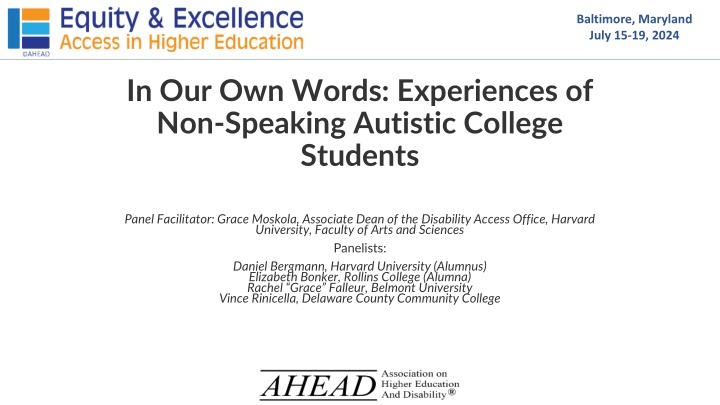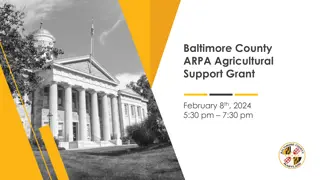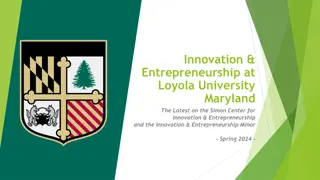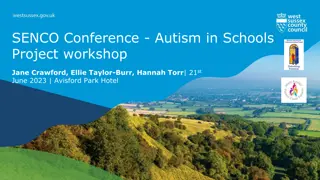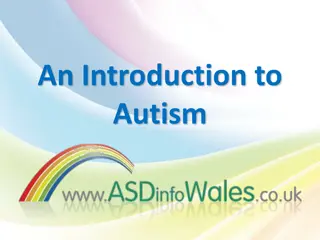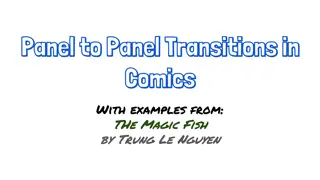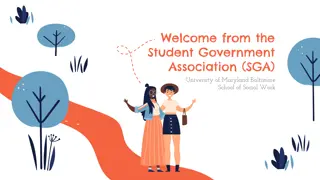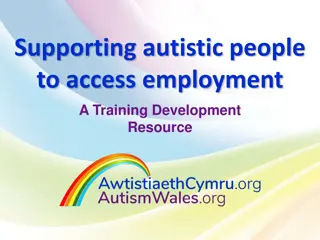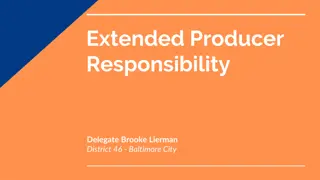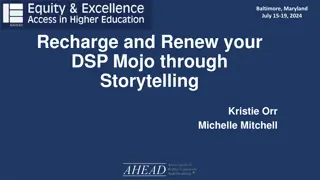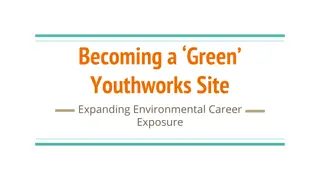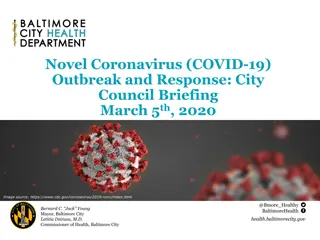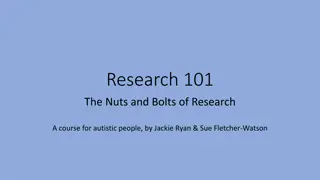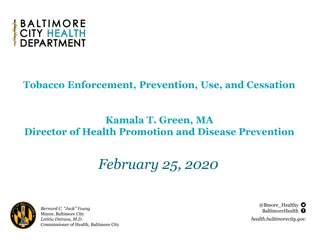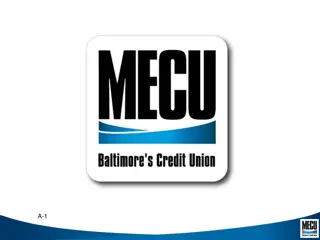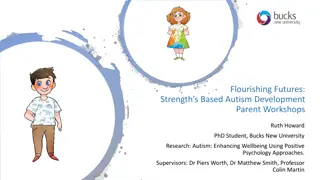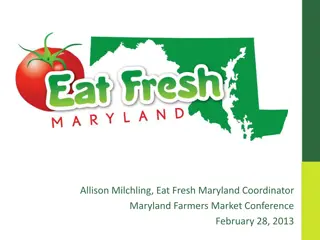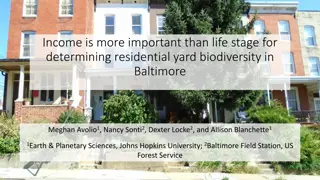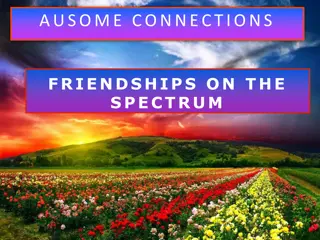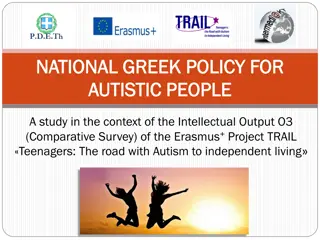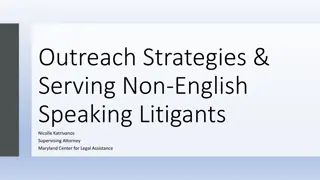Experiences of Non-Speaking Autistic College Students Panel in Baltimore, Maryland
"The conference in Baltimore, Maryland, from July 15-19, 2024, focuses on the experiences of non-speaking autistic college students. Grace Moskola, a Harvard University Associate Dean, facilitates the panel with former students sharing their insights. The event emphasizes civility, inclusion, and respect, aiming to foster learning and understanding of non-speaking individuals. Terminology and communication practices are explored, highlighting the importance of communication partners. Join this insightful session to gain a deeper understanding of autism and promote inclusivity."
Download Presentation

Please find below an Image/Link to download the presentation.
The content on the website is provided AS IS for your information and personal use only. It may not be sold, licensed, or shared on other websites without obtaining consent from the author.If you encounter any issues during the download, it is possible that the publisher has removed the file from their server.
You are allowed to download the files provided on this website for personal or commercial use, subject to the condition that they are used lawfully. All files are the property of their respective owners.
The content on the website is provided AS IS for your information and personal use only. It may not be sold, licensed, or shared on other websites without obtaining consent from the author.
E N D
Presentation Transcript
Baltimore, Maryland July 15-19, 2024 In Our Own Words: Experiences of Non-Speaking Autistic College Students Panel Facilitator: Grace Moskola, Associate Dean of the Disability Access Office, Harvard University, Faculty of Arts and Sciences Panelists: Daniel Bergmann, Harvard University (Alumnus) Elizabeth Bonker, Rollins College (Alumna) Rachel Grace Falleur, Belmont University Vince Rinicella, Delaware County Community College
Baltimore, Maryland July 15-19, 2024 Conference Civility Statement We ask you to join us in creating a culture that reflects Access and Inclusion and Civility and Respect this week and in all aspects of our organization.
Baltimore, Maryland July 15-19, 2024 Getting Started Thank you for coming! This is a 90-minute session made up of slides, videos, and a live Q&A session at the end. Panelists utilize alternative methods of communication, including spelling out words one letter at a time. When asking questions, all participants should wait for the microphone and state their name and institution or affiliation. We are here to learn from one another. Questions and curiosity are encouraged.
Baltimore, Maryland July 15-19, 2024 Terminology Non-speaking: A blanket term to describe people with motor-planning disorders such as apraxia that limit their ability to speak fluently. In this session, we are focusing on non-speaking people on the autism spectrum. Non-speaking can also include terms such as non-verbal, minimally speaking, unreliably-speaking, and others. Communication Partner: A communication partner is an assistant who verbalizes what is spelled or typed. CPs may hold or position letter boards, tablets, or keyboards and assist with body regulation issues. CPs may also be referred to as CRPs (communication and regulation partners) or PCAs (Personal Care Assistants), depending on their role. Communication Partners may or may not be related to the non-speaking person, and some non-speakers may have multiple CPs.
Baltimore, Maryland July 15-19, 2024 Grace Moskola, Associate Dean of the Disability Access Office at Harvard University, has worked in higher education disability services since 2010. Her areas of interest include leadership development, the social model of disability in practice, and expanding educational opportunity for all people. She is a member of the Communication 4 All Board of Directors. This is her fifth time presenting at AHEAD.
Baltimore, Maryland July 15-19, 2024 Vince Rinicella, 23-year-old college student, is a published author of poetry and short stories, creator and writer of a blog (The Unfiltered Mind of Vincent), and a passionate advocate for bringing forth change in our community. Vince has contributed to opening a center for spellers in his local community and is eager to support and encourage them along their communication journeys. He believes it is critically important to help ensure all non-speakers are given the chance he had, so they too can break free and live a life of their own choosing.
Baltimore, Maryland July 15-19, 2024 Vince Rinicella intro video: https://vimeo.com/961455465/3c7fcb5460?share=copy
Baltimore, Maryland July 15-19, 2024 Rachel Grace Falleur is a junior at Belmont University in Nashville, Tennessee, majoring in Neuroscience. Grace started college at the age of 16. She is passionate about autism advocacy and research and hopes to attend graduate school.
Baltimore, Maryland July 15-19, 2024 Grace Falleur intro video: https://vimeo.com/961456095/1741177eba?share=copy
Baltimore, Maryland July 15-19, 2024 Elizabeth Bonker is the Executive Director of Communication 4 ALL, a nonprofit with the mission to ensure all nonspeakers with autism have access to communication and education. Her decade of advocacy work includes a book, I Am in Here, and a music album. Elizabeth is a 2022 graduate from Rollins College s Honors Program and her valedictorian commencement address went viral with 4 billion media impressions propelling her mission onto a global stage.
Baltimore, Maryland July 15-19, 2024 Elizabeth Bonker intro video: https://vimeo.com/961455032/ec0735f6b5?share=copy
Baltimore, Maryland July 15-19, 2024 Dan Bergmann, age 28, has been living with minimal-speaking autism all his life. He learned to type when he was 12, and has been eagerly studying literature, art, philosophy, psychology, reality, and people ever since. In 2021 he became the first autistic person who typed to communicate to earn an undergraduate degree from Harvard. He has written a short film for the Metropolitan Museum of Art, a commentary for CBS Sunday Morning, and two other screenplays.
Baltimore, Maryland July 15-19, 2024 Dan Bergmann intro video: https://vimeo.com/961455724/b5647ef23c?share=copy
Baltimore, Maryland July 15-19, 2024 Otherwise Qualified The desire to learn counts more than any other qualification, and seriousness more than brilliance. - Dr. Rosa Cintr n Section 504 of the Rehabilitation Act of 1973: "No otherwise qualified person with a [disability] in the United States shall, solely by reason of a [disability], be excluded from the participation in, be denied the benefits of or be subjected to discrimination under any program or activity receiving federal financial assistance." A qualified person with a disability is defined as a person who meets the requisite academic and technical standards required for admission or participation in the post-secondary institution's programs and activities.
Baltimore, Maryland July 15-19, 2024 Participation Speaking is not a requisite to participation- communication is. Communication should be reliable, interactive, and generated by the student. Different environments require different communication strategies, such as small groups, large lectures, and online learning. Non-speaking students do not require academic standards to be changed or lessened. Accommodations create pathways to meet them.
Baltimore, Maryland July 15-19, 2024 Starting Out in College First-time college students with non-speaking autism typically have a very different educational journey than other disabled students. Special education and alternative programs Age in which communication method was realized Intensive therapies to help with body regulation issues Differences in peer support and typical childhood and adolescent social development What do we assume all first-time college students have in their tool-boxes?
Baltimore, Maryland July 15-19, 2024 Vince Rinicella commentary video: https://vimeo.com/961450534/f0b1f4a85c?share=copy
Baltimore, Maryland July 15-19, 2024 Navigating College as a Non-Speaker Identifying accommodation needs to the disability services office and making adjustments based on different environments Planning participation methods in advance Experiential and lab classes vs. typical lectures How to get involved in co-curriculars What type of residential experience makes the most sense?
Baltimore, Maryland July 15-19, 2024 Grace Falleur video commentary: https://vimeo.com/961452026/da4deede1c?share=copy
Baltimore, Maryland July 15-19, 2024 Communication with Faculty It is critical that faculty understand how non-speaking students will participate in their course and what the role of their communication partner(s) is and is not. Consider writing an introduction letter to faculty before the course begins that is separate from the accommodation notification. Request syllabi in advance when possible. Faculty and the Disability Services Office must be partners in this work to ensure an equitable experience and address access issues as they arise.
Baltimore, Maryland July 15-19, 2024 Reasonable Accommodations You may want to consider the following accommodations when working with non- speaking students, depending on their course structures: Extended time for tests Separate testing environments Use of noise-muffling headphones Focus/Regulation items allowed in class Flexibility with deadlines Breaks during class Alternative participation or presentation methods (that do not alter essential requirements) Seating location Note-taking and/or audio recording And of course- accessible communication methods (tablet, text to speech, letterboard, CP, etc.)
Baltimore, Maryland July 15-19, 2024 Elizabeth Bonker commentary video: https://vimeo.com/961449409/939ccc1e6e?share=copy
Baltimore, Maryland July 15-19, 2024 What do you mean a parent is in the classroom? Initial reactions to a faculty call from a disability services perspective: Unprepared, lack of knowledge of the student Unfamiliar with method of communication (letter board) Faculty s alarm at the situation Assumption that parents will overstep boundaries Questions of how the student would participate, self-regulate without being disruptive, take tests, and prove that the work was their own We all make assumptions. Make sure you take the time to meet with the student and learn as much as you can about their accommodation needs before jumping to conclusions. Remember- this is an interactive process and may take fine-tuning.
Baltimore, Maryland July 15-19, 2024 The meeting from Dan s perspective I was terrified to be summoned to that meeting. I walked in sure that my time at Harvard, which I loved, was about to be terminated. Thanks to Grace taking the time to get to know me, I walked out of that meeting secure in being a full-fledged member of the student community.
Baltimore, Maryland July 15-19, 2024 Dan Bergmann commentary video: https://vimeo.com/961453128/a39ceaf04f?share=copy
Baltimore, Maryland July 15-19, 2024 Every Student Adds Value It was an enormous pleasure to have you in class, your contributions were fantastic; indeed, you saved the class from moments of (embarrassing) silence a few times, so thank you! signed: the professor who was in a total panic a few months prior It is not a disabled student s job to inspire or educate others. It is the job of all students to be open to new perspectives, ideas, and ways of existing in the world. Non-speaking students have the same aspirations as all college students. They seek connection, growth, self-discovery, and ways to make a difference in the world. Our job is to keep the doors of higher education open for them.
Baltimore, Maryland July 15-19, 2024 Q&A We now open the floor to you to ask any questions that come to mind or provide feedback. Panelists responses may be brief due to the desire to answer in the most efficient way. Please speak directly to the panelists unless you have a question for their communication partners.
Baltimore, Maryland July 15-19, 2024 Thank you for attending!
Baltimore, Maryland July 15-19, 2024 Presenter Information Grace Moskola Email: Moskola@fas.Harvard.edu Website: https://dao.fas.harvard.edu/
Baltimore, Maryland July 15-19, 2024 Learn More: Communication 4 All: https://communication4all. org/ Spellers Movie: https://www.spellersfreedo mfoundation.org/spellers- the-movie
